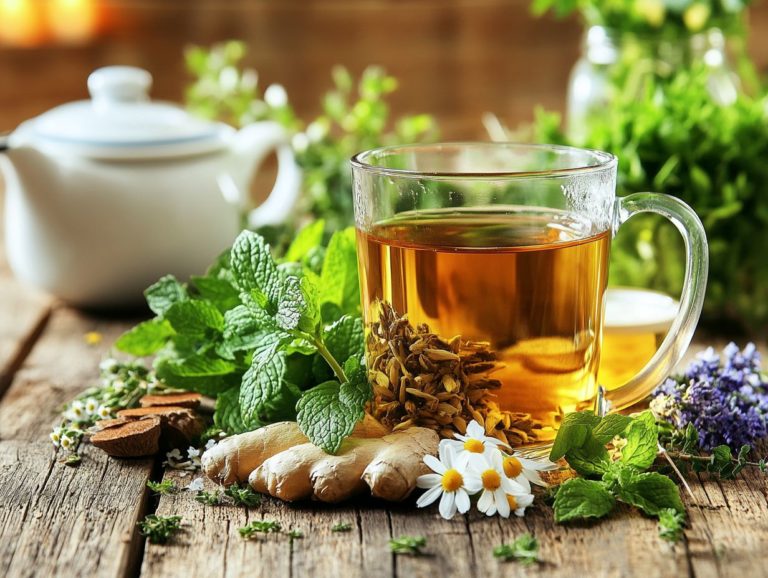What Are Herbal Remedies?
Herbal remedies have a rich history and offer natural solutions for a variety of health concerns, including serious issues related to liver and kidney disease.
Drawing from ancient traditions and evolving into contemporary practices, these plant-based treatments come in various forms. They include traditional herbal remedies and herbal dietary supplements, each promising a spectrum of benefits.
This article explores different types of herbal remedies. It highlights specific herbs that are often used and guides you on how to safely incorporate them into your wellness routine, especially for pregnant and breastfeeding women.
It also addresses potential risks and interactions with pharmaceutical medications. This ensures you are well-informed as you embark on your herbal journey.
Contents
Key Takeaways:

- Herbal remedies are natural substances derived from plants used to treat and prevent illnesses and promote overall health.
- There are various types of herbal remedies, including those made from specific herbs and those available in different forms such as teas, tinctures, and capsules.
- When used properly, herbal remedies can provide numerous benefits, including effective treatment, minimal side effects, and improved overall well-being, making them a valuable addition to your health approaches.
Defining Herbal Remedies
Herbal remedies have been cherished through the ages for their natural healing power. They utilize various plant parts roots, leaves, and flowers to harness active ingredients known for their healing benefits and potential quality issues.
Often embraced as alternatives to conventional medicines, these remedies can seamlessly integrate into a holistic approach to health. However, it s crucial to know that “natural” doesn t mean “risk-free.” Staying informed about potential issues surrounding herbal products, such as unregulated herbal remedies, is essential.
Historically, many cultures have turned to these natural solutions for healing. They choose specific plants based on wisdom passed down through generations, including well-known herbs like St. John’s Wort and Echinacea. The active ingredients found in these remedies can offer a wide array of benefits, from reducing inflammation to bolstering immune support, making them appealing for those concerned with health matters.
With the rising popularity of herbal medicine, you must remain vigilant about quality control and safety standards. The lack of regulation can raise valid concerns regarding the purity and efficacy of herbal medicines and their interaction with conventional medicines.
To navigate this landscape confidently, seek out reputable sources such as the Herbalists Association or the Medicines and Healthcare products Regulatory Agency. Ensure that the products you choose have undergone testing for contaminants and are produced under rigorous manufacturing guidelines, in line with herbal medicine quality standards. Your health deserves nothing less than the highest standards, especially when it comes to buying herbal products.
Types of Herbal Remedies
Herbal remedies can be elegantly classified into several categories: herbal supplements, herbal dietary supplements, teas, tinctures, and topical applications. Each type serves distinct health purposes and offers its own unique set of benefits, enhancing your well-being in diverse ways, particularly through herbal health practices.
Herbs Used in Remedies
Common herbs in herbal remedies include St. John’s Wort for mood enhancement, Echinacea for immune support, and Garlic for heart health. Each herb has unique active ingredients that contribute to its effectiveness, making it essential to understand the effects of herbal medicine.
These natural remedies address a range of health concerns, including interactions with conventional treatments. For example, St. John’s Wort contains hypericin, which may help reduce depression symptoms and can interact with other medications.
Research shows Echinacea can reduce the duration and severity of colds, thanks to its immune-boosting properties, as noted by the National Center for Complementary and Integrative Health.
Garlic, praised for its distinct flavor, contains allicin, a compound known for its heart health benefits by lowering blood pressure and cholesterol. Meanwhile, Ginseng may enhance physical and mental performance, making it popular for those looking to combat fatigue, especially among the elderly and children.
Lastly, Feverfew is recognized for its potential to relieve headaches, with compounds like parthenolide believed to inhibit certain inflammatory pathways, potentially preventing migraines.
Forms of Herbal Remedies

Herbal remedies present a delightful array of options, including teas, tinctures, capsules, and topical ointments. This variety allows you to select the method that best aligns with your preferences, health needs, and safety standards.
Each form offers unique benefits and considerations related to herbal supplements safety. Teas are celebrated for their calming effects and are easy to prepare—just steep the leaves in hot water. However, it’s crucial to consider whether pregnant women can use herbal remedies, so make sure to check the dietary supplement label for quality. Their potency can change based on steeping time, temperature, and the quality of the herbal products used.
Tinctures extract beneficial elements from herbs using alcohol, providing a concentrated dose that can be mixed with water or taken straight. However, they should be approached with caution due to potential side effects.
If you prefer convenience, capsules offer measured doses, perfect for those averse to herbal flavors. However, they may lack the immediate impact of teas and may not be suitable for everyone, especially pregnant women.
For localized concerns, topical ointments are an excellent choice. Always check for skin sensitivities before use to ensure your safety!
By understanding these nuances, such as the unregulated herbal market, you empower yourself to make informed decisions that truly support your wellness journey.
Benefits of Herbal Remedies
Unlock the incredible health benefits of herbal remedies! They can boost your immune system, help regulate blood pressure, and even provide relief from chronic conditions like liver and kidney disease, which are often highlighted in herbal medicine research.
Efficacy and Safety
The efficacy and safety of herbal remedies are paramount factors that require careful consideration. Not all herbal supplements undergo rigorous quality control or meet established safety standards, particularly those labeled as dietary supplements.
This uncertainty underscores the need for you to understand how these remedies work and their potential interactions with conventional medications, especially those labeled as pharmaceutical drugs. Many people mistakenly think that because these products are labeled as ‘natural’, they are automatically safe, overlooking the fact that natural doesn’t mean risk-free. For more information, you can explore how long it takes for herbal remedies to work.
This misconception can lead to adverse reactions, especially for individuals with pre-existing health conditions or those taking specific pharmaceutical drugs. Thus, it’s vital to consult a qualified practitioner in herbal medicine. Additionally, being aware of common myths about herbal remedies can help you make informed decisions. Look for reliable sources of herbal supplements that prioritize quality assurance, like those endorsed by the Medicines Regulatory Agency.
By enhancing your awareness about these aspects, you can make informed decisions and incorporate herbal remedies for weight loss into your health regimen effectively and safely.
How to Use Herbal Remedies
To harness the full potential of herbal remedies, it is crucial to understand the nuances of proper dosage and administration, as recommended by healthcare providers. This knowledge is best acquired through insights from a qualified herbal medicine practitioner or health care provider, who can offer tailored recommendations based on your individual needs.
Proper Dosage and Administration

Proper dosage and administration of herbal remedies are essential for ensuring their therapeutic effectiveness, which refers to how well the herbs work, while minimizing the risk of adverse effects. This is especially crucial for pregnant and elderly patients. It’s essential to find the right approach through consultation with your healthcare provider, particularly regarding herbal dietary supplements.
The appropriate dosage can vary significantly based on individual health conditions and age groups, such as the needs of children or the elderly. For example, older adults may metabolize herbs differently than younger individuals, necessitating adjustments in potency to prevent negative effects.
If you are pregnant or breastfeeding, exercise caution. Your body undergoes significant changes that can influence your response to herbal treatments, including possible unwanted side effects. Some remedies may even require tailored dosages for optimal results, making it crucial to seek professional guidance from qualified herbalists, especially when considering whether herbal remedies can replace prescription meds.
Potential Risks of Herbal Remedies
Even though herbal remedies come from natural sources, they can still carry potential risks, particularly in the unregulated herbal market. It’s vital to be aware of possible harmful interactions with pharmaceutical medications and any adverse side effects that may arise before beginning treatment with herbal products.
Interactions and Side Effects
Understanding potential interactions and side effects of herbal remedies is crucial for your safety, especially if you’re taking pharmaceutical medications or have pre-existing health conditions that could be affected by herbal medicines.
These natural alternatives can offer many benefits, but when mixed with conventional medications, they may lead to unexpected complications and serious health risks. For instance, St. John’s Wort, known for mood enhancement, can diminish the effectiveness of certain antidepressants, while ginkgo biloba might elevate bleeding risks when combined with blood thinners. This highlights the importance of caution with herbal medicine interactions, especially regarding scientific evidence for herbal remedies.
To navigate these complexities, it s essential to consult with healthcare providers before considering herbal supplements, especially if you are using dietary supplements. This ensures a thorough evaluation of your current treatment plans, minimizing the risk of adverse reactions and harmful interactions, and promoting better health outcomes.
Don’t overlook the importance of consulting a healthcare provider before using herbal remedies. It’s the best way to ensure your safety and health.
Frequently Asked Questions
What Are Herbal Remedies?

Herbal remedies are natural treatments made from plants, herbs, and other natural ingredients. They are used to promote health and relieve symptoms of various ailments.
How do herbal remedies work with conventional medicines?
Herbal remedies use the health benefits of plant parts like roots and leaves. They support the body’s natural healing processes.
Are herbal remedies safe?
In general, herbal remedies are safe when used correctly. Always consult a healthcare professional, like a doctor or pharmacist, before trying any herbal remedies.
What are some common herbal remedies?
Common herbal remedies include ginger for nausea, turmeric for inflammation, and echinacea for boosting the immune system. St. John’s Wort is popular for mood enhancement.
Can herbal remedies be used for children?
Some herbal remedies are safe for children. It s best to consult with a pediatrician before giving any herbal remedies, especially regarding dietary supplements.
Are there any side effects of herbal remedies?
While generally safe, some herbs can cause side effects, including allergic reactions or negative interactions with medications. Always research and consult with healthcare providers if you notice any adverse effects.






